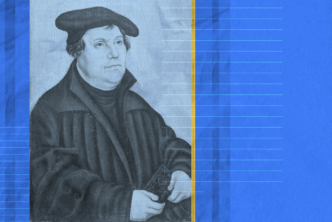When his childhood dream of being a major league baseball player bit bitter dust, Jim Hamilton realized he’d have to pick another career. He found a new passion: biblical theology, a passion that took off during his studies at The Southern Baptist Theological Seminary.
“My classmates and many of the scholars that I read were really helpful to me, and I really caught the fever for biblical theology at that time. I really wanted to understand particularly how the New Testament authors are using the Old Testament,” he said.
One of Hamilton’s professors at Southern, Dr. Thomas Schreiner, was especially helpful here. Schreiner said once in class, “The New Testament authors model for us how to interpret the Old Testament.” Schreiner’s statement nearly pushed Jim out of his seat. Prior to that comment, he says, “I had mainly been told that we should not imitate the way that New Testament authors interpret the Old.” Now he saw the reverse was true.
God’s glory in salvation through judgment
Now an accomplished author, pastor, and teacher, Hamilton is constantly applying his knowledge of biblical theology and sharing it with others. In his book, God’s Glory in Salvation through Judgment: A Biblical Theology, Hamilton explains the Bible’s message as a single, coherent whole. He described his purpose behind writing the book: “I set out to define our search for the center [of the Bible] as our search for God’s ultimate purpose,” he said. And he came to a brief, memorable, useful phrase, one which became the title of his book: the central theme of Scripture is “God’s glory in salvation through judgment.”
In his book, Hamilton explains that God uses big events such as the flood, the destruction of Jerusalem, and Christ’s return to “display [God’s] glory by saving his people through judgment.” He even sees a role for wisdom books like Proverbs in communicating this theme: “What Solomon is doing, at many points, is warning of coming judgment and showing the way to salvation,” he said. “And it’s the fear of the Lord, and particularly the fear of his judgment, through which Solomon means to lead his audience to experience God’s mercy, and to enjoy God’s glory.”
Moses’s direct encounter with God in Exodus 34 is a key passage for him.
The Lord—the Lord is a compassionate and gracious God, slow to anger and abounding in faithful love and truth, maintaining faithful love to a thousand generations, forgiving iniquity, rebellion, and sin. But he will not leave the guilty unpunished. (Exodus 34:6–7 CSB)
Hamilton is adept at connecting various parts of the Bible’s story—like this famous Old Testament scene—to the story’s climax in Christ.
So [God is] both forgiving and loving and merciful; but he’s also truthful, and he’s just, and he upholds his word, and thereby, somehow squares the circle and maintains his own character; and he is not an unjust judge who lets the unrighteous go free. But he is a just judge, who has devised a way to justify the ungodly by means of the salvation that he’s accomplished through Christ.
Hamilton structured God’s Glory in Salvation through Judgment to provide a tour through all 66 books of the Bible. He recommends his readers read his work alongside their Bibles to further understand how each Bible book contributes to the story of God’s glory in salvation through judgment.
The big story
Hamilton is optimistic about the ways in which biblical theology can enrich and guide the church’s Bible reading. If they don’t grasp the Bible’s big story, they’ll almost inevitably misunderstand some of its little ones, he says. “If we compare the Bible to a modern musical like Les Miserables or Hamilton: An American Musical, not having a good grasp of biblical theology would be a little bit like listening to one of the songs of the musical by itself. … Often, these songs that come in these musicals fit in their context; they’re [helping] tell a broader story,” Hamilton said.
“Someone who doesn’t have a good grasp of biblical theology doesn’t know the whole story,” Hamilton says. “They’re not hearing this particular part of the song where it was intended to be heard. And so they might not find it all that interesting. But if they see it in context, … they’ll feel how compelling it is and experience how each piece fits in the whole.”
Biblical theology also works to inform systematic theology. The latter, says Hamilton, “discerns from the Bible the truths that the biblical authors believed.” But that requires an understanding of the overall biblical narrative.
Hamilton gives the example of Genesis 2:24, which speaks of a man leaving his parents to become one with his wife, and he further explains how the processes of both biblical and systematic theology come into play here. “Our doctrine of marriage is derived from a narrated story of a historical event that actually took place,” he said.
Despite its valuable uses, Hamilton gives one caveat regarding biblical theology: the possibility that getting too excited about the big story will make readers start missing the trees for the forest. Sometimes, Bible readers “spend so much time talking about the big story that there’s no time left over to talk about the particular things that this author [of a particular book of the Bible] is saying,” he said.
“I think Christians need to examine the Bible directly,” Hamilton says. “We need to put the parts of the Bible in the context of the whole—we need to do biblical theology.”
Multiple perspectives on the Bible
Hamilton wants the viewpoints of the biblical authors to become his own—and the church’s own. “We’re trying to understand and embrace the perspective of the biblical authors, so that requires us to seek what the human author intended to communicate,” he says. “Then we’re trying to figure out what it looks like for us to view the world that way and to interpret Scripture that way.”
Every culture views the world through the big story they tell about the world, Hamilton says. “All humans use those big stories to validate and justify the big ideas that they believe.” They justify their behaviors through the myths they tell about the world, he says. Even postmodernists, who are famously skeptical of the big stories people tell about the world, have invented a big story—namely that there is no big story.
The Christian story, however, is not invented. It’s revealed. The Christian’s big story of the world is the Bible’s story. And this means that biblical theology is a point of unity for Christian people.
Out of our experience of God and the Word there may be some differences, but on the big ideas we’re going to have unity—it’s an amazing, transcendent and glorious unity that surpasses any of the ways in which we differ from one another.
As pastor at Kenwood Baptist Church and professor at Southern Seminary (both in Louisville, Kentucky), Hamilton has had many opportunities to preach and teach on biblical theology. And he recognizes, by God’s grace, that the Word of God has not returned void in the hearts of his listeners. He was particularly encouraged by a recent conversation with a group of his Doctor of Ministry students at Southern: “As we were talking about what biblical theology is and how it operates in our study of the New Testament, [the students] were commenting on how this way of thinking about things really changes everything. I’m often encouraged by the response of students,” Hamilton said.
Though Hamilton is passionate about biblical theology and a proponent for the study of it, he acknowledges that those seeking a thorough understanding should do more than merely read books on the topic. “I think that the best way to grow in our biblical theological understanding is to keep reading the Bible,” he said.
***
This article was originally published in the May/June 2022 issue of Bible Study Magazine. Slight adjustments, such as title and subheadings, may be the addition of an editor.
Related articles
- What Is Biblical Theology? 29 Books to Help You Go Deeper
- Writing a Biblical Theology? Top 100 Bible References to Address
- What Is Systematic Theology and Why Does It Matter?
Related resources

What Is Biblical Theology? A Guide to the Bible’s Story, Symbolism, and Patterns
Regular price: $8.99
Typology: Understanding the Bible’s Promise-Shaped Patterns; How Old Testament Expectations are Fulfilled in Christ
Regular price: $31.99

Work and Our Labor in the Lord (Short Studies in Biblical Theology)
Regular price: $9.99







